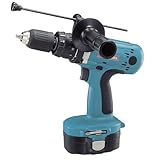
Average Reviews:

(More customer reviews)I bought one of these drills as an upgrade from the 18v non-hammer drill version.Then I returned it and found that the replacement, from a totally different source, still had the same problem. The problem is that the screw clutch would sink and STRIP a 3 inch drywall screw into a 4 by 4. And this was on the lightest setting of #1!! Talk about a misadjusted clutch! I called the repair facility and they said nothing could be done about it. I brought it to a dealer to check it out. He verified the problem with his own 4x4 and his own screw. He said "all the new Makita 18-volt cordless hammer-drills are like this and this is because it's a powerful drill"!! Gee, according to the specifications, it has 400 in/lbs of torque versus the 404 in/lbs of torque of the non-hammer drill version. Yet with the the non-hammer drill version and in every other cordless drill I own, including DeWalt, the clutches in those work just fine. With any other drill, I can sink a drywall screw into 1/8" veneer and have the clutch stop the chuck right on the money. This is not a misadjusted clutch, it's a MAJOR problem with the drills I've managed to randomly sample. This makes the drill useless to carpenters, sheet metal workers, anyone who needs to drive anything less than a 3" drywall screw into a 4x4. The drills I've managed to find are all made in Japan (this is normally great) and I was told this is because they are first-run production models. American facories haven't been geared up to produce them yet. So why aren't they being recalled? Or corrected? Why isn't there even any provision for correcting the problems at the factory repair centers? Are the manufacturers blind, daft, or do they just not care about the end-users? Why are they still trying to "push these drills out the door" on anyone who will tolerate them? Also, I don't like the idea that Makita will only sell these drills with Nickel Metal Hydride(NiMh) batteries. They should give you a choice. They should offer their drills with both types of batteries available. NiMh batteries give 30% more run time per charge, but they can only putout 2/3 the amperage of a same voltage NiCad. Although, this usually doesn't make a noticeable difference. NiMh batteries are primarily used for low drain electronics. They CAN put out amperage effectively comparable to NiCads(2/3), but when you ask them to (as all cordless drills do), they don't like it and the cells in the battery break down 2 to 3 times faster. As the battery breaks down you get less and less run time between charges. So that "extra Ah(Amp-hour)" really never happens overall. I mean it DOES at first, but then you lose it 2 to 3 times faster than you would lose the same amount of capacity in a NiCad. AND, as a result, the the total lifespan of a NiMh battery is only about 1/3 to 1/2 that of a Ni Cad battery. ALSO, when a battery sits on a shelf long enough it loses its charge. NiCads lose about 1% a day. NiMh batteries lose 3% a day. When a battery loses so much of its charge, its voltage drops. When the voltage drops below a certain value, the battery goes into what is called "reversal". This is when the chemistry in the battery begins to change its electrical polarity. When this happens, the battery quickly becomes severely damaged. This happens if you don't use the drill for a long while. With NiCads, you have to yank them out of the drill case, religiously, at least once every 3 to 6 months and charge them to keep them. With NiMh batteries, you have to pull them off the shelf and recharge them every MONTH just to keep them (not have to replace them for at least $85 a pop). Also, NiMh batteries cost about 1.6 times as much as NiCads, and when you figure that they last half as long at best, you can at least double that figure. Try this: find a drill, subtract the cost of the replacement batteries and charger, and you'll find out how much you're paying for the to drill. You see, drill manufacturers make their money on batteries. Now with the advent of "enviromentally friendly" NiMh batteries, they make two to three times as much money. Only you don't know it yet. The E.P.A. gives out tax breaks(that's money to you and me) to manufacturers who offer NiMh batteries. Here, again, it seems that Makita is not concerned with the end-user but only with how much money they can make and how much hidden expense and inconvenience the public will tolerate. See, with the new drills, Makita dosn't even give you a choice between NiCad and NiMh. They don't want you to know let alone CHOOSE. The U.S. Military has ENDED its research into high drain applications (like cordless drills) for NiMh batteries. They've GIVEN UP! It will cost them too much money. As, for Makita, all they want is more of our money. Sorry, but them's the facts.
Click Here to see more reviews about: Makita 8443DWDE 18-Volt Ni-MH Cordless Hammer Drill/Driver
Product Description:
Includes 18V Cordless 1/2" Hammer Driver-Drill - 8443DWDE-R, (2) 18 Volt 2.6 Ah Ni-MH Batteries 1834 - 193159-1, Charger - DC1801, Side Handle - 122575-0, Depth Gauge - 122576-8, Plastic Tool Case - 824546-0, Operating Manual
Want to buy Makita 8443DWDE 18-Volt Ni-MH Cordless Hammer Drill/Driver at other amazon sites? Click the corresponding icon below:






0 comments:
Post a Comment